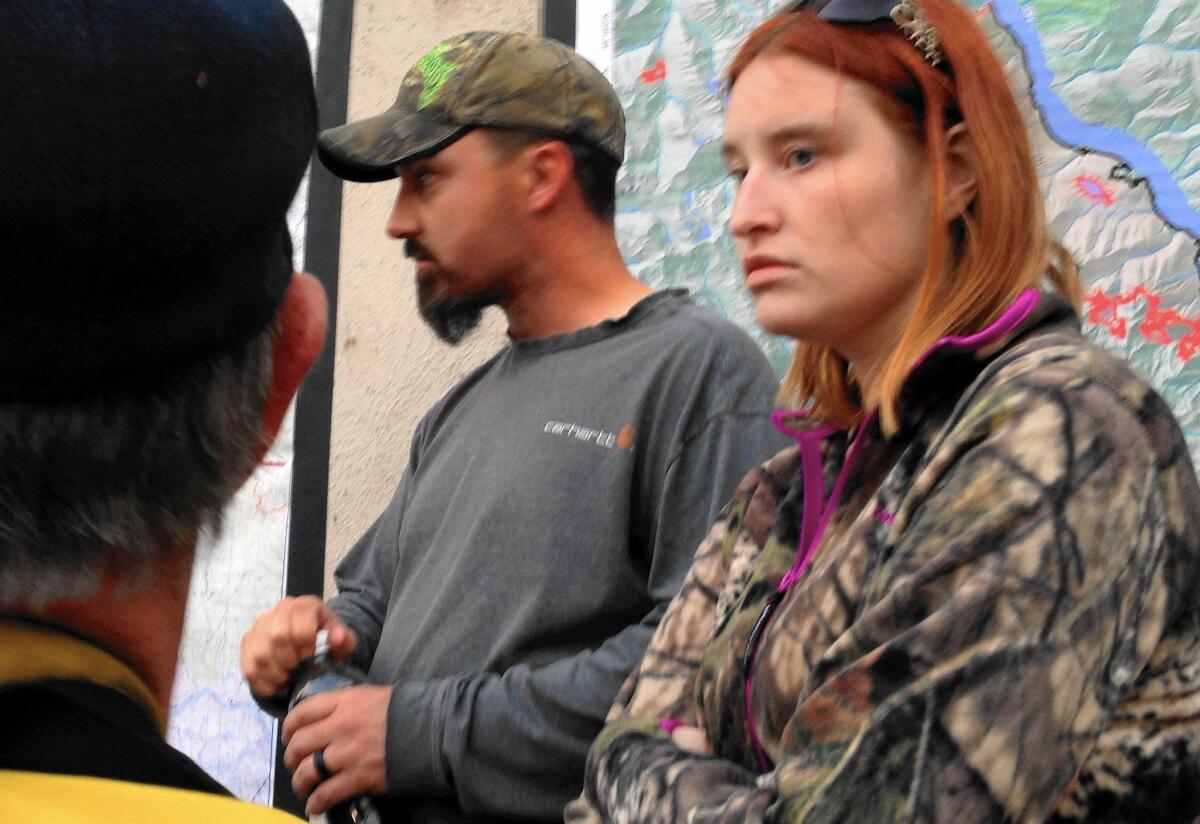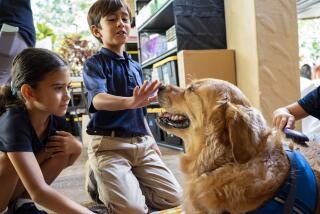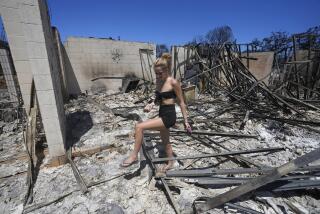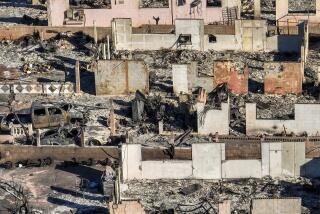Washington town, still rebuilding from 2014 wildfire, welcomes evacuees -- and their dogs

The call came at 3:30 a.m., a reverse 911 warning that jolted Jeff Nanamkin and Kari Barker awake.
Flames from the network of fires plaguing eastern Washington were threatening their home in the tiny community of Disautel. It was time to evacuate, the recorded voice warned. They packed the car, grabbed the dog and were on the road by 4.
But the Red Cross shelter in a town called Brewster turned them away — well, turned away Angel, the white Chihuahua with the big black eyes. So at 6 a.m. Friday, they found themselves here at the confluence of the Methow and Columbia rivers in Pateros, a smoky little city that knows more about fire than it ever wanted to.
Last summer, 20% of this apple-country enclave burned to the ground in the Carlton Complex fire — at more than 250,000 acres, the biggest recorded blaze in state history.
Now Pateros, as wildfires char hundreds of square miles in eastern Washington, has become something of a refugee camp, opening its doors in an act of civic payback, even though it has not fully recovered from the last round of firestorms. Only about half of the lost homes have been rebuilt. The streets are a patchwork of weed-filled lots and optimistic new construction.
Pateros Community United Methodist Church — which took in Nanamkin, Barker and Angel, among other displaced people and pets — lost its parsonage in the 2014 blaze. The back of the church was burned, its windows cracked. Houses all around it went up in flames.
The parsonage has yet to be rebuilt, but the community room has cots and coffee, air conditioning and a fondness for cats and dogs. Its parishioners and volunteers, fire victims themselves last year, are now on the giving end of tragedy’s equation. It is not always easy.
“Everything that’s going on right now is a reminder,” said Pastor Earl Lane. “So a lot of these people are reliving this. People are still processing what went on a year ago.... My people lived through it last year. The people who are being servants this year are champions.”
Cheri Ruf is one of those champions. She got to the church Friday at 6 a.m., bringing breakfast for the evacuees. She has photos in her smartphone of the Carlton Complex fire as it neared her ranch. Back then, she and her husband were evacuees too. Their home survived.
“There’s a lot of PTSD here,” Ruf said, as she thumbed through electronic images of smoke and flames. “These people who went through it and lost homes, I just feel for them.”
Evacuees come and go as officials update the paths of the fires. On Saturday winds slowed, helping firefighters somewhat, but blazes continued to rage. The fires aren’t close enough to prompt evacuation orders in Pateros, though its 660 or so residents have been told to remain on alert, as if they needed such a reminder.
For now, Pateros is a haven.
Cars and campers line Memorial Park on the shore of the Columbia River. City officials turned off the automatic sprinklers so evacuees could park or camp on the grass. One night, a battered ’72 Nova filled with possessions was parked not far from a Mercedes Sprinter RV. A little blue tent rose beside the riverbank in view of a gleaming, extra-long Airstream trailer.
A contingent of evacuees had converged on the park from nearby Winthrop, prodded by flames and smoke and wind and worry. Lucinda Tear and her greyhound-German shepherd mix were there. Tear’s house had burned down in the Carlton Complex fire. Charlotte Nelson and her husband brought poodles and chilled Chardonnay.
Ken Bevis and his wife, Teri Pieper, set up their tent camper in the long line of vehicles on Lakeshore Drive. Their bored dogs — Sky, the Labrador retriever, and Luna, the Labradoodle — were sacked out on the grass. In 2014, firefighters had saved their home in Winthrop, and Bevis composed a song about it.
As this year’s fires blazed, he grabbed his guitar and sang a few verses, an alfresco concert in a smoky park:
We did not know what to think
Didn’t know what to do
It felt like the end of the world
Ooo it was a firestorm
Never seen a thing like this
Never since the day I was born
Ooo it was a firestorm
Memorial Park abuts Pateros City Hall, where you can buy shirts printed with not one, not two, but three slogans, as if the designer could not decide what was most on point — hope or pain. “Rising from the ashes,” each shirt proclaims. And, “Pateros strong!” And, “We don’t know how strong we are until being strong is the only choice we have.”
“It’s been super-hard,” said City Administrator Jord Wilson. “You see it throughout the whole community. Anxiety is serious. Part of it is, when the fire is so big, cellphones are down. Not everyone has Internet.... People are going around with lack of sleep. Everyone’s helping someone.”
Wilson’s parents’ home burned to the ground in 2014. They had lived there 40 years. The elderly couple are rebuilding, but their new house is not quite finished. His tough, 80-year-old father is a study in nerves. But then, who here isn’t?
Sweet River Bakery, across from the park, has become a kind of living room for evacuees from hot spots such as Winthrop, Omak and Twisp, where three firefighters died in the conflagration Wednesday, plunging the threatened region even deeper into sadness.
The bakery’s coffee is strong. The pizza is made from scratch. The WiFi is free. The counter holds fliers with the latest fire conditions. But you can’t have everything. Friday night’s live music was canceled because the band had to evacuate.
Michael Self stopped by Sweet River to fuel up for the drive home to Tacoma. He was visiting the Okanogan Valley to help a cousin recover from surgery, but the last two days were a mad rush of packing house and fleeing flames.
Self’s family has lived in the region since 1888. His cousin lives on the family homestead. The retired English literature teacher wants to move back to the graceful area. The fires have not changed his mind.
“I’m looking at properties to return to the valley,” Self said, clutching coffee and cookies for the road. “I looked at seven properties in two days. Four are no longer there. I’m still going to come back. There’s no way to get away from global climate change. I want to be where I grew up and have family.”
It is easy to forget how beautiful this region can be when it is not under siege. Friday morning, the winds blew the thick smoke away, and the Columbia River sparkled. Friday night, bits of ash swirled like snowflakes, and the moon played hide-and-seek.
In between, two kids wearing face masks clambered on the jungle gym at Memorial Park. The flags in front of Pateros City Hall — at half-staff to honor the fallen firefighters — whipped wildly. A heavy wooden easel pinned with a fire map and emergency updates toppled with a loud bang.
The sky got darker and darker.
Al Myers, an evacuee from Tonasket, walked his Labrador retriever mix along the river, waited for his wife to finish using the public showers and surveyed the eerie scene. For Pateros, it was all too familiar.
“It doesn’t look good, does it?” he called out.
No, it didn’t.
Twitter: @marialaganga
More to Read
Start your day right
Sign up for Essential California for news, features and recommendations from the L.A. Times and beyond in your inbox six days a week.
You may occasionally receive promotional content from the Los Angeles Times.







